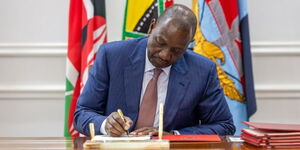As the Africa Climate Summit hosted by President William Ruto ended on September 6, one of the key messages among the 16,000 delegates was the adoption of environment-friendly modes of transport, such as electric vehicles.
Despite their cost-effectiveness compared to traditional fuel-powered vehicles, Kenyans have been slow to adopt electric vehicles in the long run.
According to a report on e-mobility by the Energy and Petroleum Regulatory Authority (EPRA) released on July 28, there are only about 2,000 EVs in the country. This accounts for one per cent of the total vehicles that were imported into the country in 2021.
As per the Kenya National Bureau of Statistics (KNBS) Economic Survey 2022, 126,415 were imported into the country in 2021.
So, what could be the reason behind the slow-paced adoption of the EVs? Kenyans.co.ke analyses;
Infrastructure
Speaking to Kenyans.co.ke Motorists Association of Kenya Chairman Peter Murima expressed that most motorists were reluctant to transition to EVs because of the lack of proper infrastructure.
The chairman explained that there were very few charging stations in the country. Most of them were also located in the city, locking out Kenyans in rural areas.
Murima added that the state of the roads and terrains also contributes to the low adoption rate.
"We have a terrain that demands a vehicle which has a good power supply every time. For EVs, you have to charge them every time and we do not have enough charging points," he stated.
Murima's sentiments were also echoed by the Matatu Owners Association CEO Patricia Mutheu, who called on the government to invest in the roads and other infrastructure if the public transport sector was to transition to EVs.
"What comes first before an investment? You cannot start living before conception. When that happens, it creates chaos. When you put the right infrastructure first, the rest will follow. That is the future, but what are the modes of transition and how long will it take?" she stated during the e-mobility conference on April 20.
Instant Gratification
According to car enthusiast Jeff Omondi, who spoke to Kenyans.co.ke, in an interview on Saturday, many motorists had a preference for fuel-run cars.
He asserted that there were occasions when motorists wanted to get a feel of the terrain, and that comes with fossil fuel vehicles.
On the other hand, he opined that the Kenyan culture of instant gratification could be the reason behind the reluctance to transition to EVs fully.
"For instance, when your fuel runs out and you refill the tank, you immediately get back on the road. However, for electric vehicles you have to wait there and let it get charged," he stated.
Omondi added that the delays in charging prevent motorists who are road trip enthusiasts from adopting the electric technology.
Economy
According to the Motorists Association, many drivers are waiting to see how the sector pans out before jumping in.
Murima added that the importation of vehicles is currently expensive, hence the recent trend where people opt for vehicle maintenance instead.
"We have a new government and it is a wait-and-see situation. We are yet to completely test the electric vehicles and see their capabilities," he stated.
Electric vehicles are more expensive than fuel cars. For instance, Autopax Air Yetu, used by Ruto during the Climate conference, goes for Ksh1.7 million. On the other hand, a Toyota Vitz with a bigger passenger capacity than the EV goes for Ksh1.3 million.
What is the Govt's Stand? As a champion of climate change, Ruto has expressed his intention to increase the number of electric vehicles in Kenya.
While on the campaign trail, the Head of State promised tax incentives for motorists in a bid to encourage the transition from fossil fuel vehicles to electric.
Way Forward
Transport Cabinet Secretary Kipchumba Murkomen predicts EVs will be a common phenomenon in the country by 2026.
He indicated that the government was keen on unlocking the sector through an efficient funding model for motorists and proper sensitisation.
"For electric vehicles, there is nothing like changing oil among other maintenance. The initial cost may be expensive but in the long run, they will benefit. I have no doubt in my mind that in the next three years, it will be a normal conversation to use an electric vehicle," the CS stated during the e-mobility conference on April 20.
Notably, the CS formed the e-mobility task force on August 4, tasked with developing guidelines that will govern the sector viewed as the future of transport.












